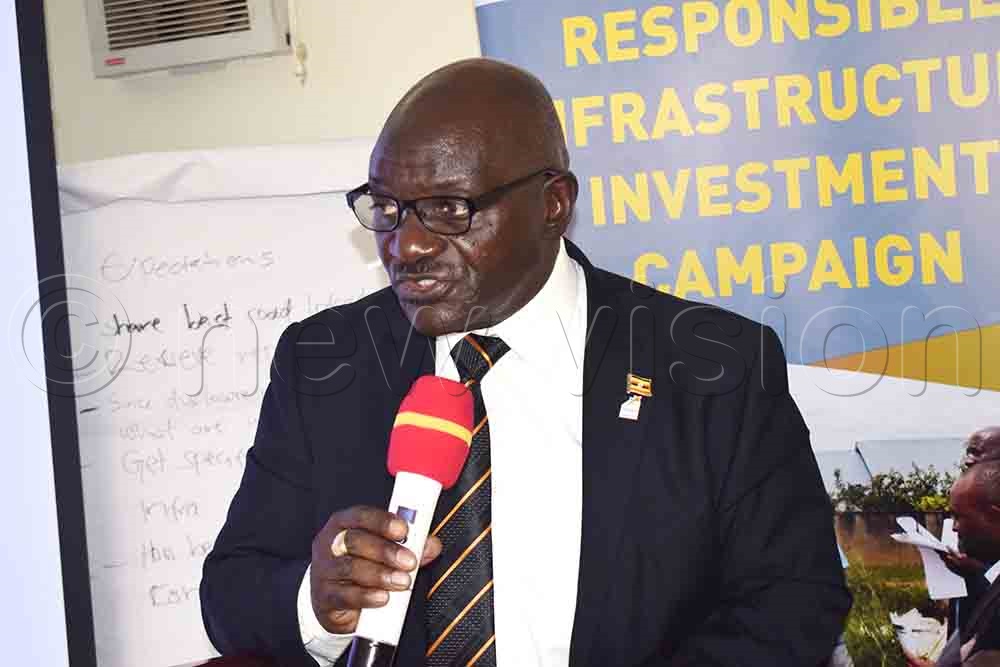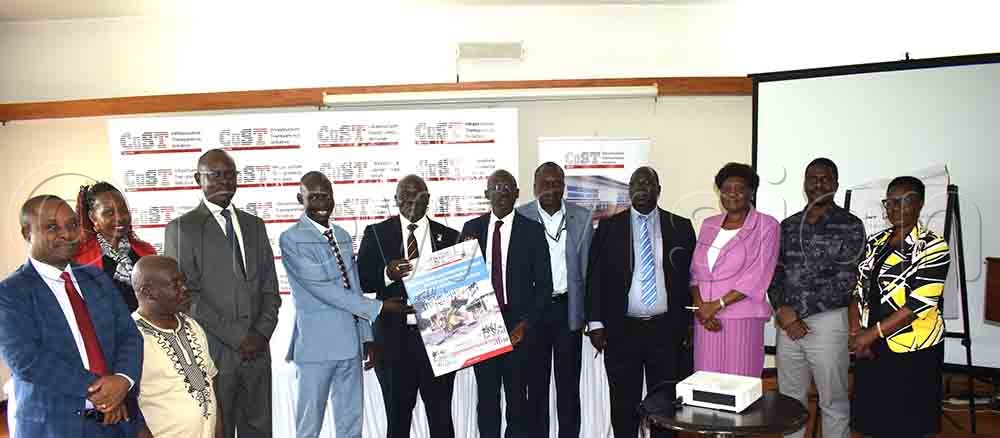Glaring accountability gaps uncovered in local government road projects
In Gomba district, the Kyai–Kyabagamba road under LEGS recorded an 86% cost overrun—a result of flawed designs and inaccurate Bill of Quantities (BoQs). The report warns that such inefficiencies could become a “gateway for misuse of public funds.”
Works Minister Gen. Edward Katumba Wamala hands over the report to Johnson Musinguzi, Acting Commissioner for Procurement Inspection and Coordination at the Ministry of Local Government.
KAMPALA - A new infrastructure audit has uncovered planning gaps and weak oversight in road projects implemented under Uganda’s Ministry of Local Government (MoLG), raising urgent questions about the integrity of public spending.
The 6th Independent Review Report by CoST Uganda, released on July 17, 2025, at Golf Course Hotel in Kampala city by works minister Gen. Edward Katumba Wamala, found cost overruns of up to 86%, project delays of over 135%, and widespread failure to plan for long-term maintenance across key local government initiatives.
“This review mirrors the government’s performance. It shows where we are succeeding—and where we must urgently improve,” Katumba said.
The report assessed 62 road projects under four programmes: The Market Agricultural Trade Improvement Project II (MATIP-II), the Project for Restoration of Livelihoods in Northern Uganda (PRELNOR), the Rural Development and Food Security Project (RUDSEC) and the Local Economic Growth Support Project (LEGS) and conducted on-site validation of 10 road projects in the districts of Kitgum, Nwoya, Gomba, Ntoroko and Kabarole.
Major findings in the independent review report include overspending, poor planning and data blackouts.
In Gomba district, the Kyai–Kyabagamba road under LEGS recorded an 86% cost overrun—a result of flawed designs and inaccurate Bill of Quantities (BoQs). The report warns that such inefficiencies could become a “gateway for misuse of public funds.”
Transparency was also highlighted as a persistent challenge. Although MoLG’s disclosure score improved to 58%, the ministry’s website was offline for three months during the audit, and one of its major programmes, PRELNOR, exited without handing over vital documents.
“How can citizens hold leaders accountable when even basic project data isn’t accessible?” CoST Uganda Manager Geoffrey Odong said.
Some programmes like LEGS fared worse, scoring just 35% in transparency. CoST urged the ministry to establish mirrored online platforms, archive systems, and enforce project documentation handovers.
Works minister Gen. Edward Katumba Wamala
Maintenance ignored, capacity lacking
The review also found that many completed roads are already deteriorating due to nonexistent maintenance plans.
|
Additionally, no clear records of asset registers, operational manuals, or routine upkeep protocols were available in most districts.
Odong said many local governments lack the technical staff to oversee or sustain these assets.
In Nwoya, a road had to be extended by 2.7km due to land disputes, without compensation plans or prior consultations. In Gomba, residents were left in the dark throughout the implementation.
“The issue is no longer just building roads. It’s ensuring they last, serve communities, and are delivered with trust,” Odong added.
Weak contracts and delays undermine impact
Contracts reviewed under PRELNOR and LEGS lacked enforceable clauses on quality, health and safety, and compliance with standards like ISO 9001:2015.
While MATIP-II and RUDSEC kept within timelines, LEGS experienced delays exceeding 135% of the contracted period.
The report urges collaboration between PPDA and the Ministry of Finance to strengthen procurement and budget planning frameworks.

Works Minister Gen. Edward Katumba Wamala launching the 2025 Independent Review Report.
Minister vows reform
Katumba hailed the audit as a tool for reform and praised CoST’s influence on improving disclosure, from 33% in 2017 to 59% today.
“We’ll use this report to realign our strategies and deliver better infrastructure outcomes,” the minister pledged.
The report comes as Uganda prepares to spend shillings 18.24 trillion on infrastructure in FY2025/26, with over 4.28 trillion allocated to core infrastructure and 6.92 trillion to transport and industrial connectivity.
“Accountability isn’t just paperwork—it’s the difference between infrastructure that empowers and infrastructure that drains,” Odong concluded.
“The results from this infrastructure assessment underscore critical issues that the Ministry of Local Government must reflect on when planning and implementing future projects," local government ministry acting procurement inspection and co-ordination commissioner Johnson Musinguzi, who represented the permanent secretary Ben Kumumanya, said.
“These findings should not only guide our ministry but also serve as a benchmark for all Ministries, Departments, and Agencies (MDAs) undertaking infrastructure development,” he said.
In addition, Musinguzi said he was encouraged that they, as MoLG, achieved a performance score of 59 per cent in this new report — a clear sign of progress.
“While there’s room for improvement, I believe these results will drive all stakeholders to do better and build stronger, more transparent, and accountable infrastructure systems across government,” he noted.